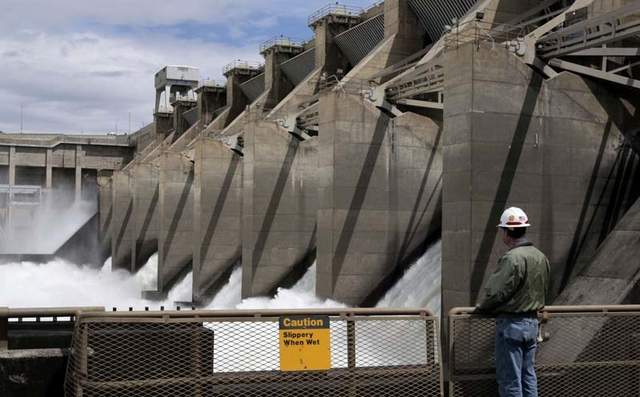forum
library
tutorial
contact

The House Passes a Bill
Limiting Water for Salmon
by Carl Segerstrom
High Country News, April 26, 2018
|
the film forum library tutorial contact |

|
The House Passes a Bill
by Carl Segerstrom
|
The legislation would override a court ruling calling for more water over dams.
 On April 25, the House of Representatives passed a bill that would override a federal district court decision mandating dam operators spill more water over dams to aid imperiled salmon. While the bill still has to clear the Senate before it becomes law -- which could be a tall task, given the thin Republican majority and opposition from Northwest senators -- it would lock in place management plans that a judge found violated federal environmental laws.
On April 25, the House of Representatives passed a bill that would override a federal district court decision mandating dam operators spill more water over dams to aid imperiled salmon. While the bill still has to clear the Senate before it becomes law -- which could be a tall task, given the thin Republican majority and opposition from Northwest senators -- it would lock in place management plans that a judge found violated federal environmental laws.
Fights over dams on the Columbia and Snake rivers have existed since they first started going up in the 1930s. While the dams have helped electrify and irrigate much of the Northwest, they have also contributed to long-term declines of salmon, leading to federal protections for the iconic fish.
Federal agencies manage the dam system and create operating plans that are supposed to balance efficient dam operations with adequate protections for endangered species. In the case that this legislation would overturn, the Nez Perce Tribe, conservation organizations and the state of Oregon argued that those plans -- a perennial subject of litigation -- didn't do enough to protect salmon and other endangered species.
In 2016, a federal district court judge ruled that they were right and that dam managers must spill more water over the dams for salmon. That decision didn't sit well with Republicans who, under the leadership of Rep. Cathy McMorris Rogers, Wash., are pushing back against it.
The strongest proponents of the bill were upstream Republicans, who assert that the judiciary overstepped in ruling against the federal management plans. The bill would enact the operating plan devised by federal agencies in 2014, until a new plan, due in 2022, comes into effect. The legislators argue that the 2014 plan -- which, during the floor debate on the bill, they repeatedly highlighted was written under the Obama administration -- represents the best available science and complies with federal salmon protections.
McMorris Rogers, the bill's sponsor, argued that it would undo the work of an unelected judge and that Congress needs to reassert its control over the dam system. "Dams and fish can coexist," she said during the floor debate. "Let's let the scientists and not one judge make the decisions on how to manage our rivers."
The spills ordered by the judge wouldn't necessarily help salmon and would cost ratepayers $40 million in lost hydroelectric revenue, McMorris Rogers said. A study by the NW Energy Coalition, however, says the electricity generated by the lower Snake River dams could be replaced at low cost and without adding any fossil fuel power plants.
Oregon Rep. Kurt Schrader, the only Democrat to voice support for the bill on the House floor, said the bill would "let the experts do their job" and pointed to sea lion depredation, rather than dams, as a major cause of salmon declines.
A letter in opposition to the bill, signed by 39 conservation and fishing industry groups, argued that the judge's decision was necessary to protect salmon and that the bill would harm the fish and undermine federal environmental regulations. In the letter to Congress, the organizations write that the bill "would thwart efforts to deliver critical near-term protections for endangered wild salmon, derail the court-ordered NEPA environmental review and increase uncertainty for Northwest citizens and businesses."
Democratic lawmakers who spoke in opposition to the bill emphasized the necessity of protecting salmon populations. Oregon Rep. Earl Blumenauer, D., said the problems on the Columbia have few good answers because we have made more commitments "than the mighty Columbia River can deliver on." He asked lawmakers to reject the bill, respect the ongoing legal process and refrain from intervening on an issue that has serious legal obligations to treaty rights and endangered species protections.
The debate and largely party-line vote on this legislation are indicative of a looming showdown over the Endangered Species Act and National Environmental Policy Act, which Republican lawmakers are seeking to reform. "The bill attempts to sidestep the Endangered Species Act and replace good science with bad politics," said Brett VandenHeuvel, the executive director of Columbia Riverkeeper. "We want our leaders to work together to protect salmon, not block actions necessary for salmon long-term survival."
learn more on topics covered in the film
see the video
read the script
learn the songs
discussion forum
